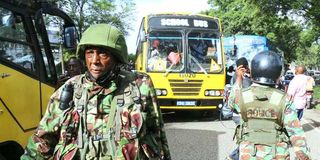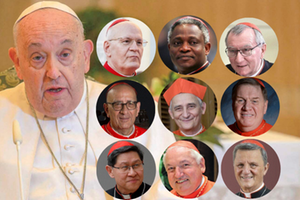
Anti-riot police escort Butere Girls school bus which was ferrying students along 58 road in Nakuru after they declined to perform their play at Melvine Jones academy on April 10, 2025.
Kenyan society is primed for low-grade violence, where the escalation from verbal altercation to physical confrontation is often a very short trip.
The physical brawl between two women MPs— for whom armed security is provided at public expense—on the grounds of Parliament this week was only the icing on the cake. Fisticuffs are the spice of life in many county assemblies.
This proclivity to violence is a defining pathology of societies that are wracked by deep frustration but lack the facility for communication. Last month, a passenger in a public service vehicle was killed after an altercation over bus fare.
Any taxi driver plying his or her trade using mobile applications in Kenya often keeps some form of sharpened metallic insurance on the floor of the car. Most vehicles registered on these apps are of very low value, with little attraction for the carjacker seeking to make a kill from reselling it, so the drivers’ threat of violence is never really for the potentially violent robbers but rather for the occasional difficult client or the regular county official using by-law enforcement to collect rents for any infraction, real or imagined.
It is much rougher for the motorcycle taxi operators in Nairobi, who are under the thumb of some rule forbidding them from entering the central business district even as numerous motorcycle riders who enjoy protection ply their trade unhindered.
It is the latter who will seize intrusive motorcycles, detain them together with the rider and call city authorities to effect arrest. One rider turned his screwdriver into a weapon to fend off a vigilante who wanted to seize his vehicle.
The rampant, heartless and indiscriminate extortion perpetrated by anyone with some authority on the poor and the hapless is driving more people to private forms of violence for self defence and protection. Typically, where there are differences of opinion, people find it easier to raise their voices rather than their arguments.
Those who are morally and intellectually challenged will typically fall back on force. It is a habit that the government has honed to a disproportionate art form. In response to invective and innuendo, the stock government response is abduction and murder. Response to criticism comes in the form of censorship and gag orders.
Kenya was founded on the logic of colonial violence, and independence never weaned it off that addiction. Citizens’ lives continue to be defined by brevity and brutality, which they reproduce in their families and communities—churches, mosques, or schools—because the State uses violence for self-legitimation.
The muscular deployment of armed police in combat gear and tear gas to intimidate high school students performing an unpublished play at a drama competition provides a clear indication of the government’s confidence deficit. The play that Butere Girls High School failed to perform because of heavy-handed government censorship and repression is easily one of the better read pieces of dramatic writing from Kenya in recent times. Soft copies of the script have been circulating online and in social media groups.
Government forces have previously moved into theatre spaces to stop the performance of artistic creations considered offensive to the establishment, but these efforts have almost always had the unintended consequence of raising awareness about and popularity of the work. It is a shame that in a society deemed to be free and democratic, citizens have had to resort to courts to protect the freedom to create art and share it.
Historically, the banning and burning books, the proscription of ideas and the assassination of writers and thinkers have not been successful as a method of silencing dissent. On the flip side, the emergence of the schools and colleges drama festival as a site for dissent is testament that in this brave new information age, opinion will not be as free as we often deem it to be.
In fact, Kenyans are turning every occasion into an opportunity to serve blistering commentary of government performance—from the turnstiles at an international soccer match to bereavements and funerals. Public anger and frustration with government and its functionaries is rising. The fusillade of criticism from every side and angle can tempt those in government to clamp down and crack down, but it would be a mistake.
Poetry can express dissent, raise awareness and inspire change without resorting to violence. Its forte is logic and persuasion, and it gives those with a contrarian view the opportunity to also sing their song. When the space for poetry and prose closes, so too does the opportunity for debate: escalation begins to look inviting.
Kenya’s brief but chequered history has shown that the nation takes huge leaps into the future when its citizens talk to each other. The present circumstances call for more, not less, freedom of expression.
The writer is a member of the KHRC board and writes in his individual capacity. @kwamchetsi. kwamchetsi@email.com.










